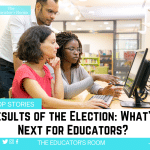Overview:
Between January 20 and January 31, 2025, Donald Trump signed dozens of executive orders that will have a grave impact on education and members of our community.
Between January 20 and January 31, 2025, Donald Trump signed dozens of executive orders that will have a grave impact on education and members of our community. The Trump administration has revoked long-standing policies that designate schools, churches, and hospitals as ‘sensitive areas.’ Other significant orders include the elimination of DEI programs, the revocation of protections for transgender students, the promotion of school choice and vouchers, freezing of federal grants and loans . . . and it’s only been 11 days.
The calls and texts began on January 21st: “Linda, what can I do?” The question comes from friends, family, or random acquaintances on social media. They are educators, parents, advocates, clients, or random people on social media. The people who see our current national reality (surreality?) as unjust are looking for guidance. They come to me because of my position as an educator, as an equity consultant, as a member of the LGBTQIA community, and as someone known for speaking my mind with compassion. After a week of disassociation, I have decided to codify the advice I give in the following nine points.
Protect yourself and those you love.
Layers upon layers. Part of protecting yourself is prioritizing self-care. Do what you need to do to preserve your mental health. I have stopped listening to podcasts on my commute. I rage sing to my Spotify. It is cathartic and keeps me from drowning in the news cycle.
The next layer is literally and physically protecting yourself. If I throw my body between an ICE agent and a student, they are not going to hesitate to go through me to get to my kid. We have to normalize teachers making themselves and their own families a priority. We did not choose our profession (nor get trained) to sacrifice our lives. We are not first responders nor members of the military. Do not feel guilty about going home safe to your family. This is an act of protecting your loved ones.
One more layer is to keep your actions local. Starting in our own community allows us to gain momentum and what starts small might grow, and even if it doesn’t, there is an immediate and personal impact. The Talmud states, “Whoever saves one life, saves the world entire.” Even small acts of care and justice can have immeasurable impact.
Bear Witness.
Follow me down this rabbit hole. In 1980 there was a CBS movie called Playing for Time. It was set in Auschwitz, based on a true story. There is a minor character in the story named Shmuel who is a Jewish handyman. As he moves through the camp making repairs, he sees and understands the full extent of the atrocities being committed. His presence in the film serves as a reminder that those who are not in positions of power have a duty to observe and remember.
We all have the ability and responsibility to serve as a witness. We need to truly see our students and their plights, to amplify their voices, and to tell their stories when those voices are extinguished.
Focus your efforts.
I do not have the energy or resources to do everything. I cannot attend every protest, every meeting, every vigil. I cannot give every dollar I have to every organization helping our vulnerable neighbors. I have to focus my efforts where I can make the most impact. Concentrate your time and resources to support one or two communities. You can choose a community which is being left out of the spotlight but is still suffering, a community of which you are a part, a community close to you physically, personally, or familially.
Pace yourself.
Change won’t happen overnight. Burnout helps no one, so it’s important to engage in ways that are sustainable for you. The work will be ongoing and our ability to stay engaged over time is just as valuable as any single action. Doing your best changes every day. Some days, you might have the energy to be out in the streets, and some days, getting out of bed is a victory. Consistency, not intensity, is what will drive lasting impact.
Support the way you can.
Supporting a cause is not a one-size-fits-all effort. What matters most is contributing in a way that aligns with your resources, strengths, and circumstances. If you have money to give, donating can make a meaningful impact. If you have the time, volunteering or spreading awareness can be just as valuable. If large gatherings are not in your comfort zone, advocacy can take other forms. Every action, no matter the form, can play a role in advancing the cause. Engage in a way that is sustainable for you and meaningful for the movement.
Find Community
Trying to take on the weight of the world alone isn’t sustainable—no one can do everything, and no one should have to. Community provides support, perspective, and the reminder that you’re not in this fight alone. Whether it’s close friends, online spaces, local groups, or simply people who share your values, being in connection with others helps keep you grounded.
When things feel overwhelming, leaning on a community can help you process emotions, find new ways to contribute, and stay motivated for the long haul. It’s okay to need encouragement, to vent frustrations, or to take a step back and let others carry the load for a while. Activism and advocacy aren’t about individual heroics—they’re about collective effort.
‘Right size’ your response
I am still working on this. My emotions are in an uncontrollable jumble and very close to the surface. It’s easy to feel like you have to carry the full weight of every injustice, but that kind of emotional overload isn’t sustainable. Being intentional about right-sizing your emotions and responses—matching your energy to what you can realistically do—helps you stay engaged without being consumed by anger, guilt, or despair.
That doesn’t mean ignoring or minimizing harm. It’s okay to feel deeply, and it’s also okay to protect your energy so you can keep showing up for the long haul. Letting yourself feel just enough to stay informed and motivated, without spiraling into hopelessness, is a skill worth practicing. It helps you focus on what’s within your power to change instead of being paralyzed by everything that isn’t. Giving yourself permission to step back when needed isn’t apathy—it’s a way to ensure you can keep going.
Offer Grace.
It’s also important to remember that just because someone isn’t showing their support in the way you expect doesn’t mean they don’t care. Not everyone is loud about what they believe in, and not everyone has the same capacity to show up in visible ways. People have their own battles, responsibilities, and limitations that aren’t always obvious.
Judging others for not being angry enough or not doing enough—at least in the way we personally define it—only drains energy from the actual work. Some folks are fighting in ways you don’t see, supporting behind the scenes, or simply doing the best they can with what they have.
Actively seek joy.
Let me tell you about Mortimer. Mortimer is a 12 foot skeleton that I pass on my way to and from work. He makes me smile everyday. In November, after the election, I needed to do something to stop my spiral into despair. In the spirit of adopting an attitude of gratitude I bought 100 blank-inside thank-you notes. The first one I left was at Mortimer’s house. It read, “Thank you for keeping your skeleton up. He makes me smile everyday. I have named him Mortimer, I hope that’s ok. I hope he stays up for a while. I am looking for a Santa hat for him.” A week later, Mortimer was wearing a garland as a scarf. Two days after that, he had a Santa hat. I left another note that read, “Mortimer! You. are. Stunning!”
As a result of being on the lookout for people to say thank you to, I am actively seeking things to be grateful for. It has been a powerful strategy to not fall into a pattern of doom and gloom and to live in the joy that continues to exist in the world.
This is the best I can do. All of this is easier said than done; but do it we must. Our students are depending on us.






Beautifully said, my friend.